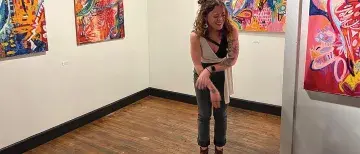
She also believes that art therapy can be for everyone.
Art therapy hinges on the belief that art making is healing and often relies on imagery to help describe feelings.
After graduating from Flagler in 2010 with a bachelor’s degrees in Psychology and Fine Arts, Schlegel went on to get her master’s degree in art therapy from Drexel University. While she loved her time in Philadelphia, she ultimately found herself back in Florida.

At her private practice in Jacksonville, she works mostly with teens and adults, and provides a safe space for LGBTQ+ clients. She sees a broad range of clients, ranging from as young as 4 years old to 70, as well as clients with low vision and selective mutism. Although their goals and experience creating art in therapy may vary drastically, they all share in the experience of using art to identify and express their emotions.
“If we think back to a strong memory that we have or a strong emotion, the first thing that's going to come to mind is not a word to describe it. It's going to be like a somatic feeling or an image. And so, I think art really allows that deeper exploration into the human experience,” Schlegel said.
When Schlegel first got to Flagler, she had her sights set on becoming a general talk therapist. She intended to major in Psychology and minor in English. Despite having a passion for creating art, she had no intentions of making a career of it.
Still, art was central to her life and she decided to enroll in a few fine art classes. It was in these classes that she would be reminded of her positive experience in art therapy as a teenager.
“It’s hard being a teen girl, man. I spent five or six weeks at an inpatient facility and I hated therapy. I hated group, but we had an art therapy group,” Schlegel said. “When I was at Flagler, I was reflecting on that group and how it was really the only thing that resonated for me in terms of not only was it therapeutic just to sit and make art, but also that art could be used as a means of communication. It took the pressure off of saying the right thing or being worried about explaining myself correctly in a therapy session.”
After this light bulb moment, Schlegel decided that she would delve into art therapy as a career.
“And the rest is history,” Schlegel said.
From there, Schlegel would do an independent study with Fine Art Professor Laura Mongiovi. She also attended Professor Mongiovi’s sculpture classes and became her studio assistant.
There are lessons Schlegel learned from her art classes at Flagler that stick with her to this day. Like how Professor Mongiovi taught her to create art with unconventional materials such as scraps from groceries.
“She taught us to gesso the back of cereal boxes instead of canvas, essentially as a surface to paint on. I think about that all the time. I also have had many clients just gesso random surfaces so they can turn it into a canvas. Not only is that a little bit different than a canvas, it's also so much cheaper. I use that still.”
Upon reflecting on her time at Flagler, she had another realization. At the time, she didn’t consider herself to be a talented illustrator.
“Oh man, my drawing classes at Flagler … I was not a good drawer.” But in her experience as an art therapist, she’s come to believe the result is not what matters – it’s the act of creating it that does.
“So very often we don't take the time to just sit down and doodle. And that's such a freeing kind of exercise. So even just taking an art class, you're sort of going through art,” Schlegel said. “I think I would encourage somebody to allow themselves to see these art classes as a learning opportunity, but also to remember that there really isn't a wrong way to make art.”
To Schlegel, art is subjective, meant to be interpreted differently by every single person that views it, but what we get out of it is the ability to let go.
“We try so many things and it’s OK to not be good at something. I think once we reach adulthood, it's really hard to push through that discomfort of, ‘I'm not immediately good at this.’ That in itself is such a beneficial thing to be comfortable with. Because then you can apply it to other situations that you don't really have control over.”
Identifying this “inner critic” and choosing to focus on the act of making art plays an integral role in Schlegel’s role as an art therapist.
“I try to enforce with my clients that it’s about the process, not the product.”



